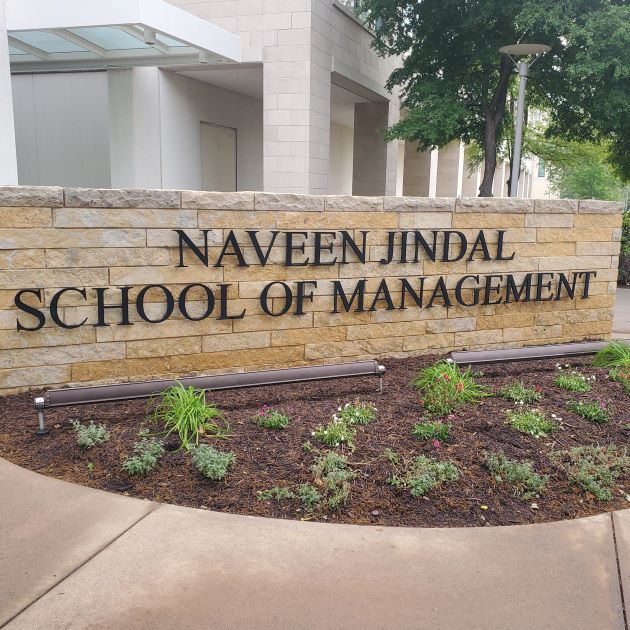Grocery store customers are fast becoming experts in supply chain — that invisible link from producer to consumer that flows from raw material suppliers through truckers, warehouse operations, grocery store deliveries and shelf stockers to end up in a shopper’s cart.
That stream of products, studied by researchers at the Naveen Jindal School of Management, is in the COVID-19 limelight as shoppers struggle to find toilet paper, eggs and canned soup one day, and cleaning supplies, milk and fresh fruit the next.

“We are in a situation in which nobody — the government, companies or the public — is certain about the duration of the crisis,” said Dr. Ganesh Janakiraman, a UT Dallas Ashbel Smith Professor of Operations Management at the Jindal School. “The concern about the availability of supplies was likely driven more by fear than fact.
“But this kind of fear spreads very fast, especially in today’s world where, if one person finds that their store has run out of tomatoes, they immediately inform the world by social media, and soon, everyone is stocking up on tomatoes.”
The concept applies to all items, the most obvious being toilet paper, he said.
Not the Usual Panic Buying

“This kind of panic buying seems different from what supply chain experts are used to, for example, before a big hurricane hits,” said Dr. Dorothee Honhon, a Jindal School associate professor of operations management. “It is greater in magnitude and is hitting product categories that few people would have predicted. Personally, I had not seen toilet paper coming.”
Ronnie Herrera, MA’77, is an independent food marketing executive based in Fort Worth who has more than 25 years in the industry. He said he is in touch with large food suppliers for restaurants and retailers. The restaurant portion of that business has declined precipitously, with family companies facing economic crisis. Meanwhile, he is putting food in retail space at a rapid clip.
“What’s scaring me more than anything is the fear factor driving this — where is this going,” he said. He talked with three grocers last week. “It’s not that the market isn’t adaptable. It’s just that we don’t know where the end is.”
Technology and Real Time Collide

Janakiraman said supply chain networks, highly connected via technology with vast amounts of information readily available, understand that supplies are depleted, and that triggers demand for more product at the production end. “While this technology works in real time,” he said, “the physical flow of product through the supply chain takes time. That time exacerbates the perception of scarcity.”
“In the big picture, retail supply chains can be stressed end to end,” said Dr. Milind Dawande, Mike Redeker Distinguished Professor in Management and coordinator of the Operations Management Area at the Jindal School. “Production capacity could be constrained due to a shortage of temporary labor. Demand is also impacted because of factors such as reduced income and restaurant closures.”
And then, he said, the logistics — matching supply with demand —– can be impacted by something as simple as the availability of truck drivers.
Channeling Demand
While no one in the supply chain can stop impulse buying, they can, to an extent, channel consumer demands. There is general agreement that putting limits on certain items (say one multipack of toilet paper per shopper) helps consumers realize there is enough product for everyone.
“Another idea is to shift consumer demand toward long-lasting food by stocking and advertising such items, such as canned foods,” Dawande said.
“Stores can also move to the front-of-the-aisle promotional display certain items which are substitutes to high-demand products,” Honhon said. She pointed out another tactic being used by Amazon to reduce panic: Prioritizing delivery for essential items — food, cleaning supplies and the like. Of course, those who order books and sports equipment are seeing delivery times of weeks, in some cases, for their nonessential orders.
And anyway, Honhon said, many people have stockpiles of items they purchased in the past month. “Even the fresh aisle was decimated at my grocery store. Yogurt, meat, milk; all of it was gone. So it was not just long shelf-life items,” she said. “I worry that many of the fresh products which were panic-purchased may end up being wasted. Most people do not cook much at home. People will quickly get sick of eating cans of chickpeas. And most restaurants are still doing delivery and pickup orders.”
Out of the Shadows
In the end, it is people who keep the food picked and processed, shipped to stores and on shelves.
These parts of the supply chain have, until now, operated largely in the shadows. “I think we should all take a moment to acknowledge the people who work at various parts of these supply chains,” Janakiraman said, “particularly the delivery professionals who are now working twice as hard in the field while the rest of the world is sheltering at home.”





